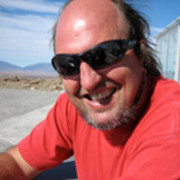
Charlie Haskell
Charlie Haskell's parents were teachers, and as a result their Ashburton-born son grew up at various points around Southland. That rural upbringing had a hand in Charlie's decision to study property management at Lincoln University. Bachelor of Commerce in hand, he then did some travel before beginning the studies that would feed directly into his screen career. Based at the Christchurch Arts Centre, the one year filmmaking course saw students working in a hands-on environment, often shooting on 16mm (the course was later reborn in Wellington under new owners, run as the NZ Film and Television School).
By the early 90s Haskell had begun a line of assistant director jobs on movies and miniseries. The Piano (1993) was the project that taught him the most, thanks largely to veteran Australian assistant director Mark Turnbull – a "class act" whose attention to detail meant he was "interested in everything and everyone" on-set.
For Haskell The Piano was a watershed movie in other ways – marking an era where New Zealand showed the world it could make quality movies (Once Were Warriors and Heavenly Creatures followed soon after). The following year was another important one, with the launch of a series that gave Haskell (and the industry) intense weekly training in stunt scenes and design-heavy production. First off the bat were five Hercules tele-movies, with Haskell as an assistant director; then a number of television series, including directing duties on Hercules spin-offs Xena: Warrior Princess and Young Hercules, plus Jack of All Trades.
Haskell argues that Hercules marked the moment when locally-staffed second units graduated from being a small crew that mops up scenery and easy pick-up shots, to a fully-fledged film crew in its own right. "We were shooting quite big sequences, and crane shots that the main unit didn't have time to do." The last Hercules tele-movie saw Haskell directing in all but name, although his first official directing credit was later episode 'The Power' (1996).
Haskell went on to direct another 10 instalments of Hercules and Xena, including two episodes from a key story arc in Hercules' fourth season. 'Encounter' and 'When a Man Loves a Woman' saw Hercules battling the villainous Ares (Kevin Smith) for the first time, and star Kevin Sorbo marrying the woman who would later become his real-life partner as well.
In this period Haskell also directed for two shows he feels deserved longer runs: 16 episodes of Young Hercules (starring Ryan Gosling and Dean O'Gorman), which provided a more youth-orientated take on the legendary character, and six of retro adventure Jack of All Trades, co-starring Shortland Street's Angela Dotchin.
Haskell's first feature-length project followed in 1999. Shot in four weeks on a US $3.5 million budget, Fearless was intended as a pilot for an American series. This time O'Gorman played one of a team of extreme adventurers in Queenstown. The following year Haskell rejoined Kevin Smith and Angela Dotchin for Lawless: Dead Evidence, the second of a trio of tele-movies based on Smith's rough and tumble private investigator.
Since then he has rejoined Hercules/Xena producer Rob Tapert on other projects, and directed more than 60 episodes for the Power Rangers franchise. He was a natural choice when it came to two very different Kiwi shows. Margaret Mahy dystopia Maddigan's Quest, for which Haskell helmed five episodes, was a rare international TV production written by New Zealanders. Meanwhile Rachel Lang/James Griffin hit The Almighty Johnsons again saw the Hercules director melding drama, comedy and fantasy in one show.
In 2009 Haskell helmed episodes of ensemble thriller The Cult, "a great show to work on", before signing on for his third tele-feature: the award-winning Tangiwai - A Love Story, based on the 1953 Tangiwai train disaster.
"The biggest challenge was to make something that lived up the fantastic script," says Haskell. "On the ground there were two really huge challenges: making the train crash believable, and the cricket game in South Africa." (one real-life plot strand saw the fiancee of one of the passengers representing New Zealand overseas). A 35-metre long model of the train awas built to recreate the crash: careful placement of extra and long lenses to keep the crowd out of focus helped the latter.
Haskell then teamed up with Tangiwai writers Paula Boock and Donna Malane for another tale inspired by truth: tele-movie Pirates of the Airwaves tells the story of the birth of Kiwi pirate radio from a boat on the Hauraki Gulf. Mixing dramatic footage, archival images and interviews with key players in the Radio Hauraki story, it was nominated for Best Television Feature at the 2014 Moa Awards.
Haskell rejoined Boock and Malane for the opening episodes of German-Kiwi murder mystery The Gulf. Kate Elliott stars as an obsessed cop who has just survived a car accident. Peopled by an all Kiwi cast, the first season was structured so that it could screen as six 45 minute episodes, or as three self-contained TV movies.
Haskell also worked on Danish-Kiwi series Straight Forward, then directed 2020 TV movie Toke, in which a trio of Coromandel orchard workers get caught up in crime after discovering a much sought after strain of marijuana.
Profile updated on 3 September 2020
Sources include
Charlie Haskell
Sarah Nealon, 'Lucy Lawless stars in Toke, a new drama about Kiwifruit and cannabis' Stuff website. Loaded 3 September 2020. Accessed 3 September 2020
Robert Weisbrot, Hercules The Legendary Journeys - The Official Companion (New York: Doubleday, 1998)